HostGator and GoDaddy are similar in many ways. They both offer affordable hosting and are easy to get started. Both hosts are excellent choices for a simple personal or business website with moderate traffic. However, HostGator takes the lead on most criteria we use to judge the Best Web Hosting Companies and even made it to our top list.
Here’s our side-by-side comparison of HostGator vs. GoDaddy.
HostGator Pros and Cons
Pros
- Affordable, scalable plans
- Responsive round-the-clock support
- Free site migrations
- Easy to use cPanel
Cons
- No free domain
GoDaddy Pros and Cons
Pros
- All-in-one hosting, website building, and domain registration
- Choose between cPanel and Plesk
- One-click backups and restore
- Top-notch security
Cons
- Can’t switch between themes
- Slow customer support
Site Uptime: HostGator Wins
You want your website to be always available, as you lose revenue and customer interest every time your site is down. So you want to shoot for as close to 100% uptime as possible.
Both HostGator and GoDaddy guarantee good uptime. However, HostGator has the edge over GoDaddy. HostGator guarantees 99.99% uptime compared to GoDaddy’s 99.97% uptime.
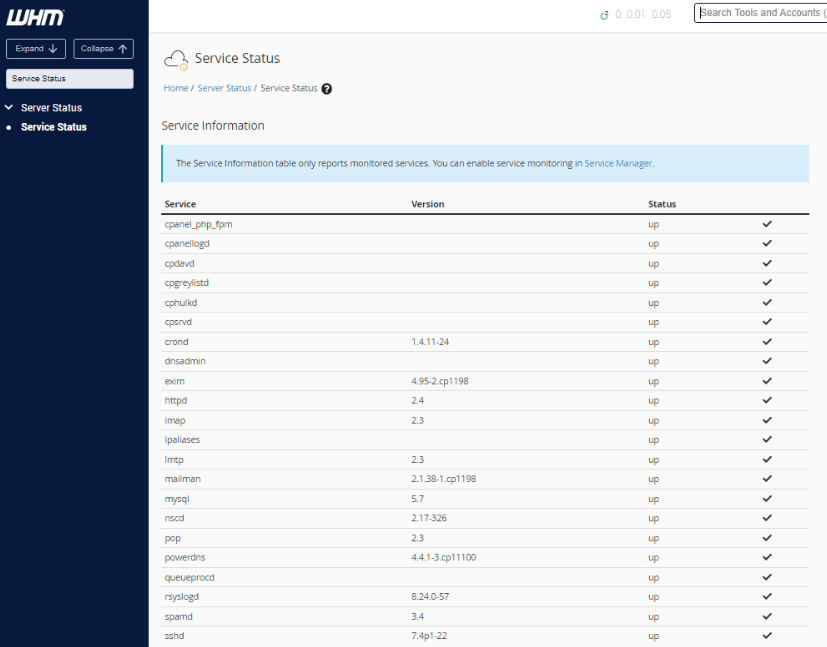
HostGator is also serious about its uptime guarantee. For example, you get a free one-month credit for your hosting package if the uptime falls below the guarantee. Of course, there is some fine print, such as planned server maintenance not counting towards downtime, but it’s still a great deal.
GoDaddy offers a similar guarantee. But you are only eligible for a 5% credit of your hosting fee, which you can use to purchase GoDaddy products or services. So again, there is some fine print, but the guarantee isn’t quite as attractive as HostGator’s.
Site Speed: HostGator Wins
Research shows that most people will leave a web page if it takes more than three seconds to load. And the bounce rate increases the longer your site takes to load. So site speed is a crucial factor when choosing a web host.
HostGator and GoDaddy keep this critical factor in mind. So your site loading speed is unlikely to surpass the three-second mark with either host. However, HostGator is marginally better in this metric.
GoDaddy isn’t far behind. The host runs on Intel Core i7 processors. So you’re guaranteed optimum site loading speed. However, HostGator does a slightly better job and is the safer bet.

Customer Support: HostGator Wins
Tech support is crucial in case something goes wrong with your site. HostGator and GoDaddy are once again evenly matched for support options. Both web hosts offer 24/7 phone and chat support. However, HostGator has a slight edge over its competitor.
HostGator also offers tech tickets in addition to phone and chat support. It’s a good option if you don’t want to sit on the phone waiting your turn. Unfortunately, GoDaddy doesn’t have a ticketing service.
Furthermore, GoDaddy has slower support than HostGator. For example, HostGator’s live chat is nearly instant. But, you might have to wait a few minutes before you are connected with a human agent on the GoDaddy live chat.

Traffic Volume: HostGator Wins
As you scale your website, how much traffic your web host can handle becomes more critical. You don’t want your website to crash unexpectedly, especially during peak traffic like Black Friday or Christmas.
Unfortunately, both hosts don’t do very well with traffic spikes on shared hosting plans. However, HostGator does a notably better job than GoDaddy, with fewer errors and requests timing out. As a result, you might want to upgrade to VPS hosting as soon as your budget allows you to avoid these problems on either platform.
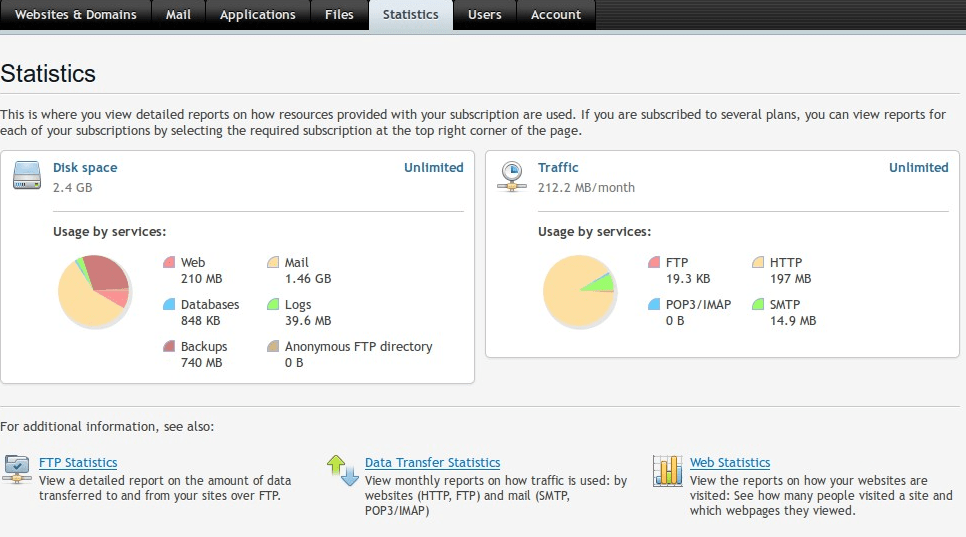
Price: HostGator Wins
You certainly want to get the best deal for your hosting service. Fortunately for us, HostGator and GoDaddy offer affordable plans. The entry-level plans are perfect for getting started and come with all the essentials you need for your site to go live. Of course, you can always scale up later.
Overall, HostGator offers better value for money. Each of its plans is cheaper than a GoDaddy equivalent. For example, HostGator’s plans are as follows:
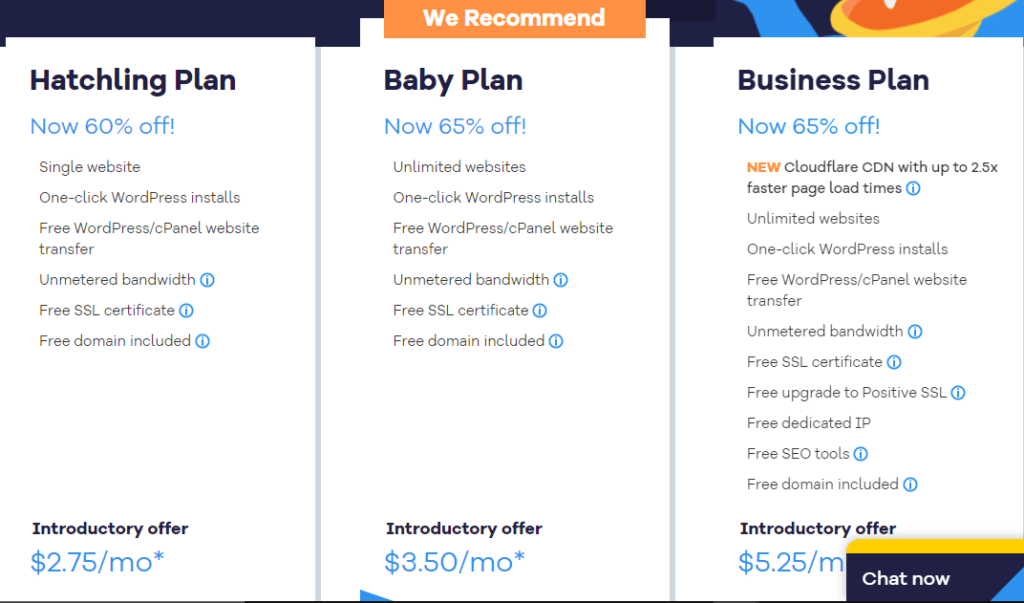
Hatchling Plan – Pricing starts at $2.75 per month. You get a free domain, SSL certificate, and one-click WordPress installs. This plan supports one website and offers unlimited bandwidth.
Baby Plan – Pricing starts at $3.50 per month. The plan supports unlimited websites and free WordPress or cPanel website transfer.
Business Plan – Pricing starts at $5.25 per month. You get free SEO Tools, dedicated IP, and an upgrade to Positive SSL in this tier.
HostGator offers freebies for all its plans, including unmetered bandwidth, SSL certificate, domain registration, and one-click app installs.
By comparison, GoDaddy has four pricing plans, including:
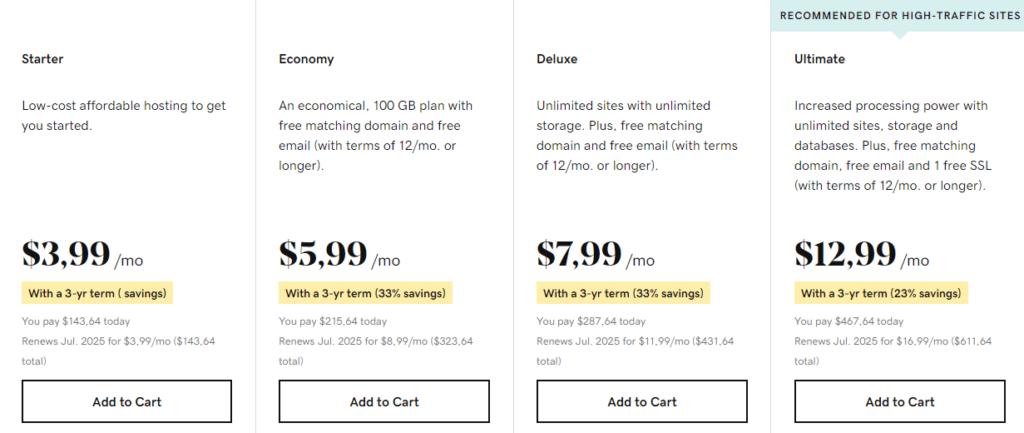
Starter – This plan costs $3.99 per month. It supports one website. You get unmetered bandwidth, daily backups, one database, and 30 GB storage. You also get a one-click WordPress install.
Economy – The plan costs $5.99 per month. You get a free professional email and a free domain for the first year.
Deluxe – This plan costs $7.99 per month. The plan supports unlimited websites. You also get 25 databases and unlimited storage.
Ultimate – This plan costs $12.99 per month. It has increased processing power, unlimited databases, and a free SSL certificate for one year.
GoDaddy has extra features for all its plans, including 1-click domain name setup, 1-click app installs, and daily backups. However, you don’t get a free SSL certificate unless you’re on the Maximum plan.
Alternatively, the Ultimate plan offers a free SSL certificate for one year. So, you’ll probably be shelling out at least $60 per year for what HostGator provides free.
As you can see, each HostGator plan is cheaper than the GoDaddy equivalent. But, there’s another subtle difference. HostGator guarantees the same speed and performance for all its plans. So, you get the same speed and performance with the Hatchling Plan as you would with the Business Plan.
Conversely, GoDaddy increases its speed and performance as you move up the pricing tiers. So, the entry-level plans might not be an option. This is especially true for high-traffic sites.
Lastly, HostGator sweetens the pot with a 45-day money-back guarantee compared to GoDaddy’s 30-day money-back guarantee. So HostGator is undoubtedly the better deal.
Migration Features: HostGator Wins
Depending on your hosting service, migrating an existing site can be easy or a headache. HostGator takes the cake here with easy and seamless migration. You only need to navigate to your dashboard and click Request Migration.
Then, fill out a form and leave it to HostGator to take care of the rest. It doesn’t matter if you’re migrating WordPress or cPanel. HostGator has you covered. The best part? Migration is free with HostGator. So make sure you claim free migration within 30 days of signing up to HostGator.
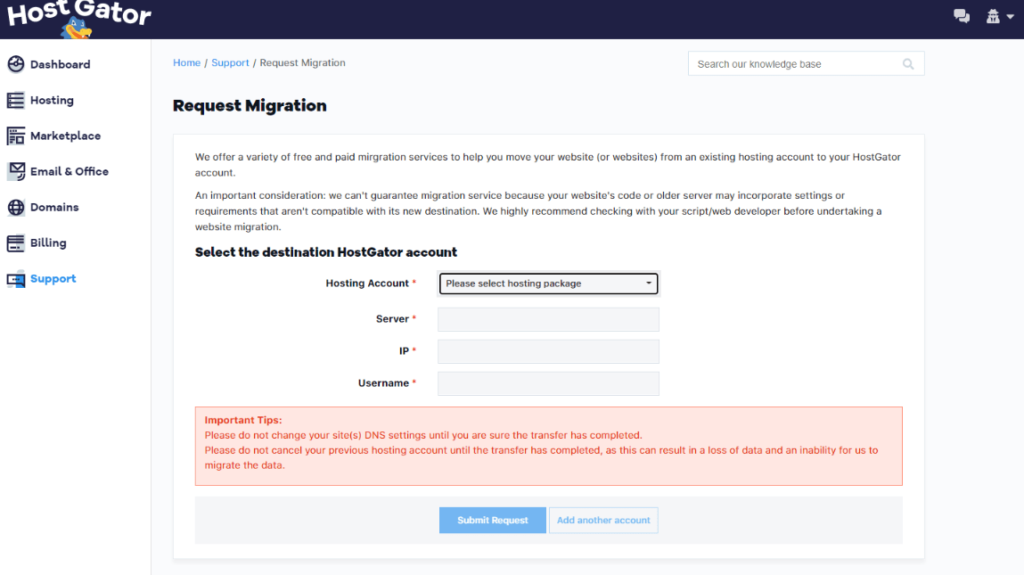
It’s worth mentioning that there is some fine print you should read through before opting for HostGator free migration. For example, the free migration only counts for the website content and data as-is at the migration time. In addition, you’ll be charged for moving your website to an existing domain or changing your website’s URL. However, it’s still a good deal.
The migration process is less straightforward than at GoDaddy. You’ll have to do it manually if you hope to migrate your site to GoDaddy for free. It’s a technical process involving an FTP client to copy your website files from your local computer to GoDaddy servers. In addition, some configuration is involved, like changing your Domain Name System (DNS) settings.
Alternatively, you can call support and let the hosting provider handle the migration. However, the service will cost you somewhere in the $99 range. On the other hand, HostGator offers a terrific deal if you’re migrating an existing website to its hosting service.
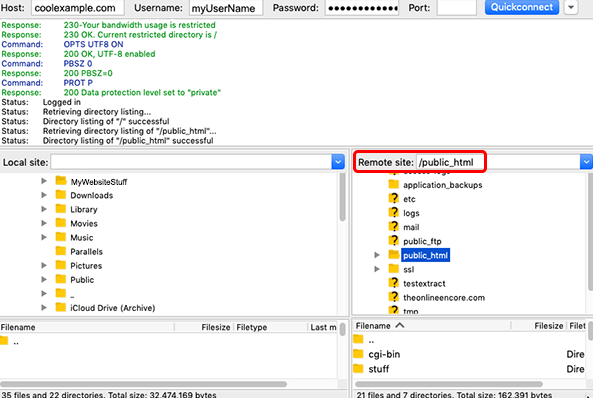
Managed Hosting: GoDaddy Wins
Managed hosting is a top priority for site owners who prefer a hands-off approach to hosting. Managed hosting comes with optimized performance. Plus, you can let the experts worry about the administrative tasks while focusing on your core business. HostGator and GoDaddy both offer managed hosting for WordPress.
HostGator offers three pricing plans for managed WordPress hosting. These include:
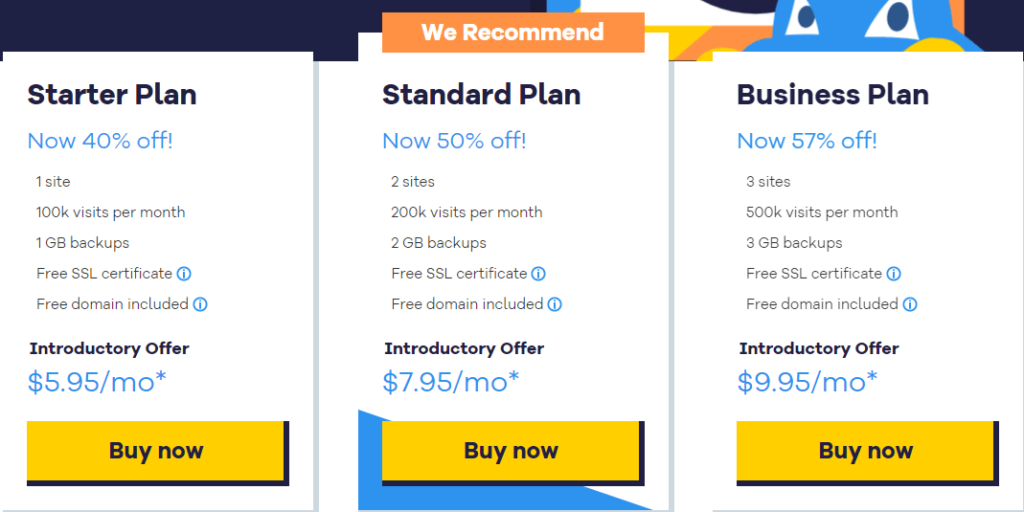
Starter – This plan has an introductory rate of $5.95 per month for one website. The plan supports up to 100,000 visitors per month. In addition, you get free migration, one-click WordPress installations, a free domain, and a 99.9% uptime guarantee. HostGator will also match your Google Ads spending with credits up to $500 for all plans.
Standard – The Standard plan offers an introductory offer of $7.95 per month. The plan supports two WordPress websites and up to 200,000 visitors.
Business – This plan has an introductory offer of $9.95 per month and supports three WordPress websites. The plan is also suitable for up to 500,000 visitors.
The best part is you get all managed hosting features regardless of your plan. You’re only paying extra for more websites and traffic. Some of the standard hosting features across all HostGator-managed web hosting include:
- Access to hundreds of themes
- Up to 25 mailing lists
- Unlimited email aliases and autoresponders
- Backups
- Automatic malware removal
On the downside, HostGator isn’t transparent about the actual price of its managed hosting service. You’re only getting an introductory offer when you sign up. You’ll need to check your control panel to determine how much you’ll pay once the initial period expires.
GoDaddy offers four pricing tiers for managed WordPress hosting. These include:
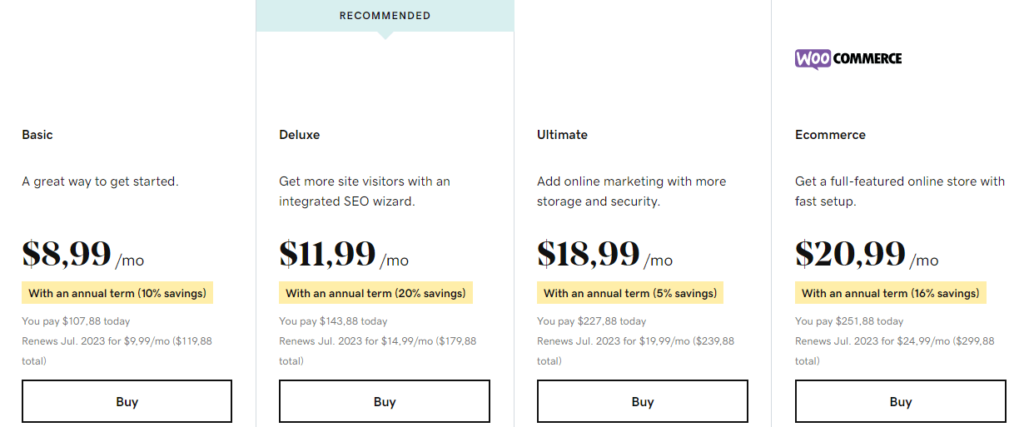
Basic – Costs $8.99 per month. The plan supports one website and up to 25,000 monthly visitors. It also comes with website backups, one-click restore, 30 GB storage, two free Microsoft 365 mailboxes, a free domain, and daily automatic malware scans.
Deluxe – This plan costs $11.99 per month. It also supports one website and up to 100,000 monthly visitors. In addition, you extend your storage space to 75 GB. You also get add-ons like SEO optimizer and a one-click testing site.
Ultimate – Costs $18.99 per month. It’s suitable for one website and unlimited monthly visitors. You also get unlimited storage and five free Microsoft 365 mailboxes.
Ecommerce – The top managed hosting plan costs $20.99 per month. It includes extra features like appointment scheduling, unlimited products, and real-time shipping rates. You also get access to $6,000 worth of WooCommerce premium extensions.
GoDaddy plans do support more websites. Additionally, you get all managed hosting features regardless of your plan. You only pay extra to account for multiple websites and increase monthly traffic. The only downside is that GoDaddy isn’t as transparent with the actual price when the discount period expires.
We considered the above critical features when composing our top list of the best web hosting providers. We’ll examine a few more crucial features before concluding the final verdict.
Website Backup: HostGator Wins
Losing a website is a nightmare scenario for admins. Unfortunately, accidents happen all the time, and you might erroneously delete critical files. Or, you might be the victim of a ransomware or other malware attack. Backups are essential for restoring your website to its last known working version.
HostGator and GoDaddy offer self-managed backup. The service is free. However, you’ll need to pay for website restoration in both cases if you want your host to handle the process. HostGator’s restoration service much cheaper at around $20. You could pay up to $180 for the same benefit from GoDaddy.

Control Panel: GoDaddy Wins
Web hosts provide a control panel where you can manage your hosting. For example, the cPanel lets you handle one-click installations, account administration, file management, backups, and domain management. Both control panels are intuitive and easy to use.
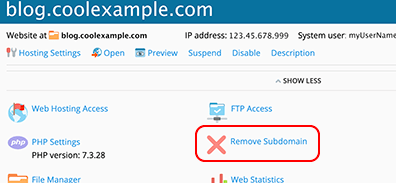
However, GoDaddy also offers Plesk in addition to a cPanel. Many WordPress admins may prefer Plesk for its familiar interface. In addition, Plesk has a cleaner interface and is more user-friendly than a cPanel.
Final Verdict
HostGator and GoDaddy are similar in many ways. For example, their plans, features, and prices are relatively similar. However, you see notable differences in favor of HostGator when you consider performance, reliability, and customer support. Therefore, HostGator wins this head-to-head comparison.
from Quick Sprout https://ift.tt/zgXBIOT
via IFTTT

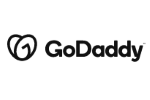
No comments:
Post a Comment